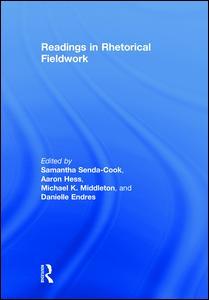Description
Readings in Rhetorical Fieldwork
Coordinators: Senda-Cook Samantha, Hess Aaron, Middleton Michael, Endres Danielle
Language: English
Subjects for Readings in Rhetorical Fieldwork:
Keywords
Sierra Nevadas; scholars; Young Man; critics; Rhetorical Field Methods; vernacular; Outlaw Discourses; ecologies; Public Sphere Scholars; invention; Local Watershed Council; gun; Responsible Memory Work; qualitative; Critical Rhetorical Scholars; research; BBM; rhetoricians; Vice Versa; study; Communication Subdisciplines; Aaron Hess; Vernacular Rhetoric; Michael K; Middleton; Rhetorical Salience; Danielle Endres; Drug Education; Gerard A; Hauser; Gun Ri; Dwight Conquergood; Iowa DNR; Kenneth S; Zagacki; BBM; Victoria J; Gallagher; Museum Park; Ralph Cintron; North Korean Soldiers; Cindy M; Spurlock; Austin Weird; Greg Dickinson; BBHC; Brian L; Ott; Public Memory Scholars; Eric Aoki; Plains Indians; Suhi Choi; Terministic Screen; Marouf Hasian; Vernacular Narratives; Rulon Wood; Phaedra C; Pezzullo; Karma R; Chz; Jenny Edbauer (Rice); Peter Simonson; Joshua P; Ewalt; Jessy J; Ohl; Damien Smith Pfister; erin daina mcclellan; Heather Brodie Graves; S; Scott Graham; Carl Herndl; Caroline Gottschalk Druschke
Publication date: 09-2018
· 17.8x25.4 cm · Hardback
Publication date: 09-2018
· 17.8x25.4 cm · Paperback
Description
/li>Contents
/li>Readership
/li>Biography
/li>
Readings in Rhetorical Fieldwork compiles foundational articles highlighting the development of fieldwork in rhetorical criticism. Presenting a wide variety of approaches, the volume begins with a section establishing the starting points for the development of fieldwork in rhetorical criticism and then examines five topics: Space & Place; Public Memory; Publics and Counterpublics; Advocacy and Activism; and Science, Technology, and Medicine. Within these sections, readers evaluate a full spectrum of methods, from interviews, to oral histories, to participant observation. This volume is invaluable for advanced undergraduate and graduate students of rhetorical criticism, rhetorical fieldwork, and qualitative methods looking for a comprehensive overview of the development of rhetorical fieldwork.
Starting Points. Attending to the Vernacular: A Plea for an Ethnographical Rhetoric Hauser. Ethnography, Rhetoric, and Performance Conquergood. Articulating Rhetorical Field Methods: Challenges and Tensions Middleton, Senda-Cook, and Endres. Critical-Rhetorical Ethnography: Rethinking the Place and Process of Rhetoric Hess. Space and Place. Rhetoric and Materiality in the Museum Park at the North Carolina Museum of Art Zagacki and Gallagher. Excerpts from Angels Town: Chero Ways, Gang Life, and the Rhetorics of Everyday Cintron. Performing and Sustaining (Agri)Culture and Place: The Cultivation of Environmental Subjectivity on the Piedmont Farm Tour Spurlock. Public Memory. Spaces of Remembering and Forgetting: The Reverent Eye/I at the Plains Indian Museum Dickinson, Ott, and Aoki. Silencing Survivors’ Narratives: Why Are We Again Forgetting the No Gun Ri Story? Choi. Critical Museology, (Post)Colonial Communication, and the Gradual Mastering of Traumatic Pasts at the Royal Museum for Central Africa (RMCA) Hasian and Wood Publics and Counterpublics. Resisting ‘National Breast Cancer Awareness Month’: The Rhetoric of Counterpublics and Their Cultural Performances Pezzullo. Counter-Public Enclaves and Understanding the Function of Rhetoric in Social Movement Coalition-Building Chávez. Unframing Models of Public Distribution: From Rhetorical Situation to Rhetorical Ecologies Edbauer Advocacy and Activism. The Streets of Laredo: Mercurian Rhetoric and the Obama Campaign Simonson. Activism, Deliberation, and Networked Public Screens Rhetorical Scenes From the Occupy Moment in Lincoln, Nebraska Ewalt, Ohl, and Smith Pfister. Narrative as Vernacular Rhetoric: Understanding Community Among Transients, Tourists and Locals mcclellan Science, Technology, and Medicine. Marbles, Dimples, Rubber Sheets, and Quantum Wells: The Role of Analogy in the Rhetoric of Science Graves. Multiple Ontologies in Pain Management: Toward a Postplural Rhetoric of Science Graham and Herndl. Watershed as Common-Place: Communicating for Conservation at the Watershed Scale Caroline Druschke
Samantha Senda-Cook (PhD, University of Utah) is an Associate Professor in the Department of Communication Studies and an affiliated faculty member with the Environmental Science and Sustainability programs at Creighton University. She studies rhetorical theory and analyzes environmental communication and materiality in the contexts of social movements, outdoor recreation, and urban spaces/places.
Aaron Hess (PhD, Arizona State University, Tempe) is an Assistant Professor of Rhetoric and Communication at the Downtown campus of Arizona State University. His scholarly trajectory can be traced through two foundational avenues—participatory rhetorical methods and digital rhetorical theory—which offer methodological rigor and theoretical insight into his research.
Michael K. Middleton (PhD, University of Utah) is an Assistant Professor of Argumentation & Public Discourse and the Director of the John R. Park Debate Society in the Department of Communication at the University of Utah. Michael’s research focuses on rhetoric, argumentation, public discourse, and cultural studies in the contexts of political advocacy and social movements.
Danielle Endres (Ph.D., University of Washington) is a Professor of Communication and affiliated faculty in the Environmental Humanities Program and the Global Change and Sustainability Center at the University of Utah. Her research focuses on the rhetoric of controversies and social movements including environmental justice, American Indian activism, nuclear waste siting decisions, climate change activism, and energy policy.




